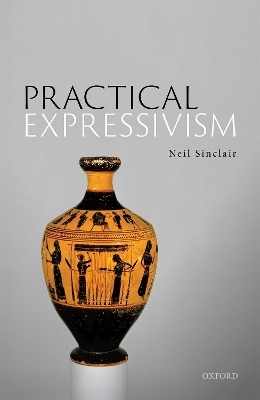
Practical Expressivism
Oxford University Press (Verlag)
978-0-19-886610-7 (ISBN)
What is morality? In Practical Expressivism, Neil Sinclair argues that morality is a purely natural interpersonal co-ordination device, whereby human beings express their attitudes in order to influence the attitudes and actions of others.
The ultimate goal of these expressions is to find acceptable ways of living together. This 'expressivist' model for understanding morality faces well-known challenges concerning 'saving the appearances' of morality, because morality presents itself to us as a practice of objective discovery, not pure expression.
This book demonstrates how a properly developed expressivist view can overcome this objection, by showing that even if moral practice is fundamentally expressive, it can still come to possess those features that make it appear objective (features such as talk and thought of moral disagreement, truth and belief, and the applicability of logical notions to moral sentences). The key to this development is to emphasise the unique and intricate practical role that morality plays in our lives. Practical expressivism is also practical in the further sense that it provides repeatable patterns that expressivists can deploy in coming to understand the apparently objective features of morality.
Neil Sinclair studied Philosophy at Cambridge and Oxford, culminating in a PhD from Cambridge in 2006. Subsequently he has taught philosophy at several UK Universities, including Bristol, Oxford, St. Andrews, and Nottingham. He was awarded a University of Nottingham Lord Dearing Award for Teaching in Learning in 2014 and the Marc Sanders Metaethics Prize in 2016. He has published more than 25 papers on metaethics including for journals such as Analysis, Biology and Philosophy, and Philosophical Studies. He is the editor of The Naturalistic Fallacy (Cambridge University Press 2018) and Explanation in Ethics and Mathematics (with Uri D. Leibowitz, Oxford University Press 2016) and an area editor for Ergo: An Open Access Journal of Philosophy.
Preface
1: The Subject Matter of Metaethics
2: Practical Expressivism, Morality's Function, and Moral Attitudes
3: Practical Expressivism, Expression, and Quasi-Realism
4: Moral Disagreement and Reason-Giving
5: The Frege-Geach Problem
6: Subsentential Metasemantics
7: Truth, Truth-aptness, and Belief
8: Mind-Independent Moral Truths and Categorical Moral Reasons
9: Practical Expressivist Strategies and Presumptive Arguments for Realism
10: Conclusion
Appendix A: Comparison with Other Versions of Expressivism
Bibliography
| Erscheinungsdatum | 08.04.2021 |
|---|---|
| Verlagsort | Oxford |
| Sprache | englisch |
| Maße | 160 x 240 mm |
| Gewicht | 618 g |
| Themenwelt | Geisteswissenschaften ► Philosophie ► Ethik |
| ISBN-10 | 0-19-886610-0 / 0198866100 |
| ISBN-13 | 978-0-19-886610-7 / 9780198866107 |
| Zustand | Neuware |
| Haben Sie eine Frage zum Produkt? |
aus dem Bereich


